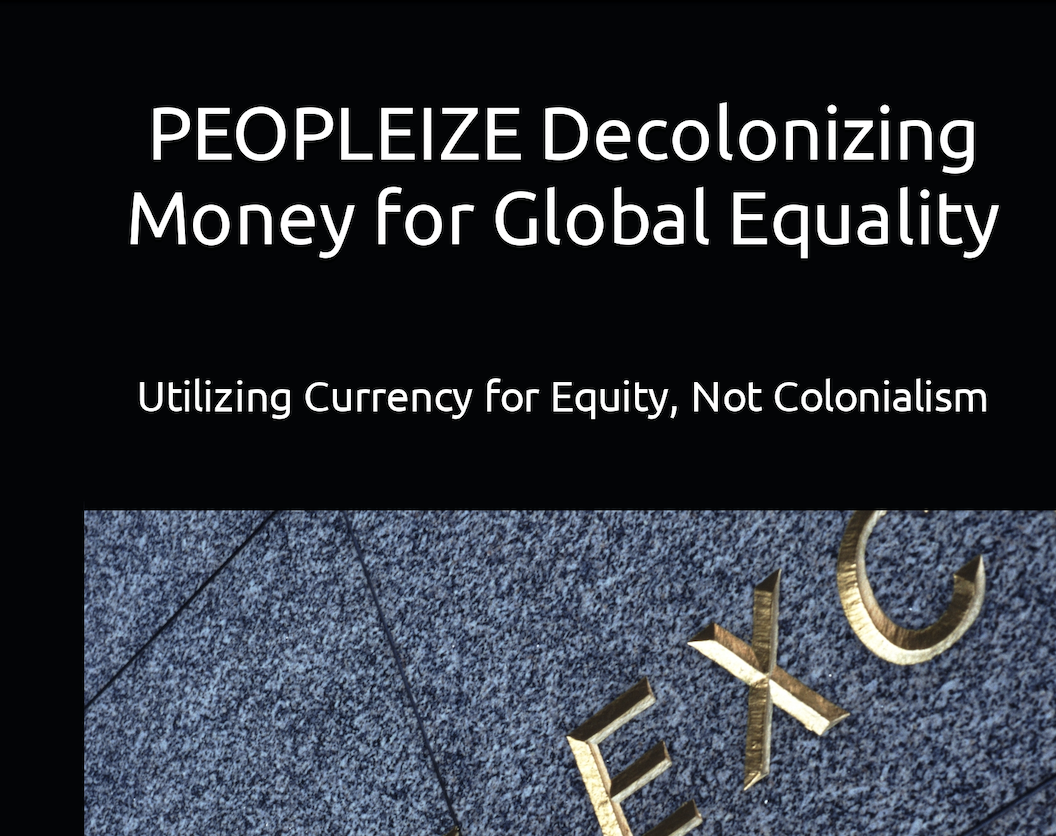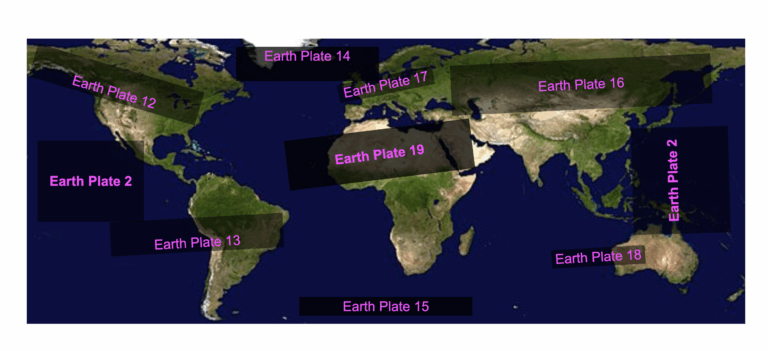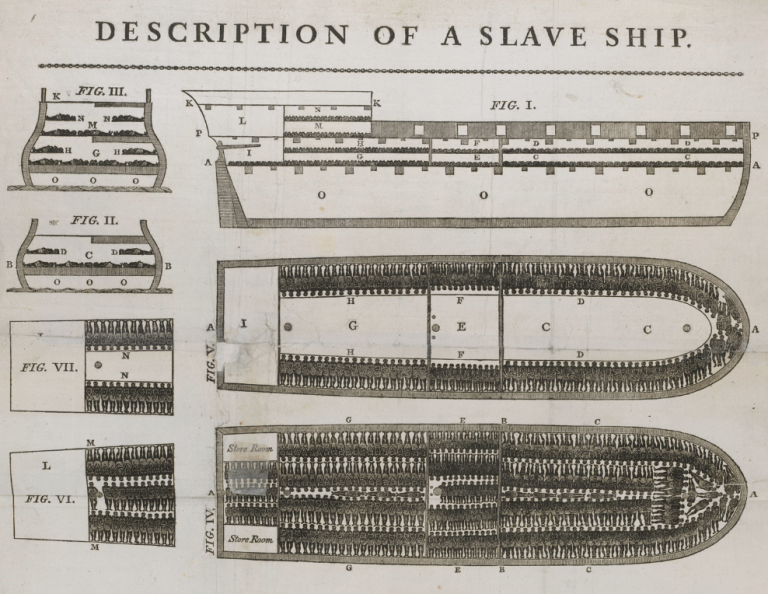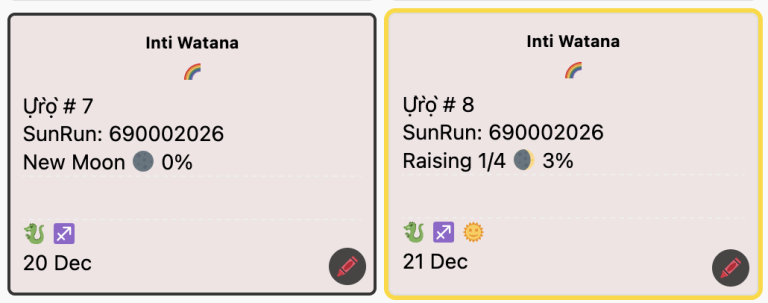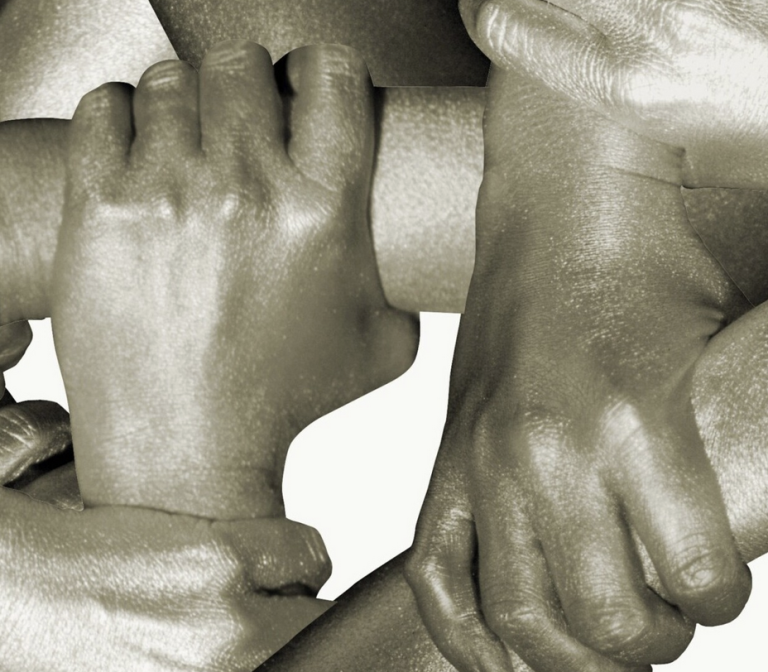Chapter III
PEOPLEIZE Currency for Equity and Sustainability: Redefining the Logic and Value of Money
Redefining the Logic and Value of Money requires us to challenge deeply ingrained perceptions and assumptions about the nature of currency. Often viewed as an inherent measure of worth, money is traditionally associated with tangible assets or commodities, such as gold or silver. However, delving deeper into the essence of money reveals its fundamentally artificial nature, a construct whose value is derived not from any intrinsic worth but from collective human agreement and societal structures.
At its core, money is a social and symbolic construct, a medium of exchange that facilitates transactions and enables economic activity within societies. Its value is not inherent in the physical form of paper bills or metal coins but is instead imbued by the trust and confidence that individuals and institutions place in it. This trust is rooted in the belief that others will also accept this form of currency in exchange for goods, services, or other forms of value. In essence, money is a shared illusion, a collective agreement that grants it the power to represent and facilitate the exchange of goods and services within an economy.
Highlighting the artificial nature of money invites us to reconsider its value not as an absolute measure of worth but as a dynamic and evolving concept shaped by human interactions and societal norms. The value of money fluctuates not only based on economic factors such as inflation or interest rates but also on broader social, cultural, and political dynamics. For example, the value of a currency may be influenced by perceptions of stability, trust in government institutions, or even cultural beliefs about the role of money in society.
By emphasizing that the value of money is derived from human agreement, we challenge the notion that wealth and worth are synonymous. The accumulation of money does not inherently equate to value or moral worth; rather, it reflects the ability to navigate and succeed within existing economic systems. This reframing encourages us to consider alternative measures of value beyond monetary wealth, such as social capital, community well-being, and environmental sustainability.
Moreover, recognizing the artificial nature of money opens up possibilities for reimagining and redesigning our monetary systems to better serve the needs of society. It invites us to question the structures and mechanisms that perpetuate inequality and financial exclusion, such as interest rates, debt-based economies, and wealth concentration. By understanding that money is a human creation, we empower ourselves to shape its value and purpose in ways that align with our collective values and aspirations.
In redefining the value of money challenges us to transcend its material form and see it as a social construct shaped by human agreement. By acknowledging its artificial nature, we open the door to new possibilities for designing more equitable, inclusive, and sustainable economic systems. This shift in perspective invites us to consider the true purpose of money, to facilitate exchange, promote well-being, and serve the common good of all members of society.
PEOPLEIZE Currency Alternatives:
PEOPLEIZE Currency Alternatives represent a revolutionary approach to monetary systems, aiming to challenge the dominance of centralized banking institutions and promote financial inclusivity and autonomy. In exploring the potential of decentralized currencies, we embark on a journey to reimagine the very nature of money itself, envisioning a world where financial transactions are conducted peer-to-peer, without the need for intermediaries or centralized authorities. While cryptocurrencies have garnered significant attention in this space, we will explore the concept of a state-owned paper money as a tangible alternative that harnesses the principles of decentralization and decolonization.
Imagine a state-owned paper money system, issued and regulated by governments and local authorities, but operating independently of traditional banking institutions. This alternative currency would be decentralized in nature, meaning that transactions would be recorded on a distributed ledger maintained by a network of participants, rather than being controlled by a single entity. By leveraging blockchain technology or similar decentralized protocols, this PEOPLEIZE currency system would ensure transparency, security, and trust in financial transactions, while empowering individuals to transact directly with one another.
One of the key benefits of a PEOPLEIZE state-owned paper money system is its potential to democratize access to capital and financial services. Unlike traditional banking systems that often exclude marginalized communities and small businesses from accessing credit and financial resources, this alternative currency system would be inclusive and accessible to all. Individuals and businesses would have the opportunity to participate in the issuance and distribution of the currency, enabling greater financial empowerment and economic resilience at the grassroots level.
Moreover, a state-owned paper money system could serve as a catalyst for economic development and innovation. It have no interest rates or making money off of loans. By providing a stable and reliable medium of exchange, this alternative currency would facilitate trade and commerce, spur investment in local economies, and stimulate entrepreneurial activity. Additionally, the decentralized nature of the currency would foster innovation in financial services, opening up new avenues for peer-to-peer lending, crowdfunding, and other forms of decentralized finance (DeFi) that empower individuals to take control of their financial futures.
Furthermore, a state-owned paper money system would promote financial sovereignty and independence from external influences. Unlike conventional currencies that are subject to manipulation by central banks and financial institutions, this alternative currency would be immune to inflationary pressures and currency devaluation, ensuring the preservation of wealth and purchasing power for individuals and communities. By breaking free from the constraints of centralized banking systems, individuals would have greater control over their financial destinies, fostering a more equitable and resilient economy for all.
In exploring the potential of decentralized currencies through the lens of a PEOPLEIZE state-owned paper money system offers a glimpse into a future where financial systems are democratized, inclusive, and resilient. By harnessing the principles of decentralization and democratization, this alternative currency system has the potential to revolutionize the way we think about money, empower individuals and communities, and build a more equitable and sustainable economy for future generations.
How would it work:
The implementation of the PEOPLEIZE paper money system envisions a transformative shift in the way currency operates within economies, emphasizing principles of equality, sustainability, and collective well-being. Here is how it would work:
National Currency Creation: Each country would have the authority to print its own PEOPLEIZE paper money, a form of currency designed for everyday transactions within the country. This national currency would serve as a medium of exchange, unit of account, and store of value, functioning much like traditional fiat currencies. However, the key difference lies in its principles and mechanisms of operation.
Equal Value Across Nations: The value of each country’s PEOPLEIZE paper money would be standardized and equalized across all participating nations. This means that one unit of PEOPLEIZE in one country would have the same value as one unit of PEOPLEIZE in another country. This equality in value eliminates disparities caused by fluctuating exchange rates, making international trade and collaboration simpler and more efficient.
Elimination of Artificial Controls: Crucially, the PEOPLEIZE paper money system would be free from artificial mechanisms that manipulate or control the value of the currency. This includes the absence of interest rates, inflationary pressures, or other forms of monetary policy interventions that traditionally influence currency values.
Facilitating Everyday Transactions: PEOPLEIZE paper money would be used by individuals, businesses, and organizations for everyday transactions, such as buying goods and services, paying bills, and conducting local and national trade. Its ease of use and stability in value would make it a reliable and efficient medium of exchange, fostering economic activity and financial stability within each country.
International Trade and Collaboration: Beyond domestic use, PEOPLEIZE paper money would facilitate international trade and collaboration among nations. Countries could engage in trade agreements and partnerships knowing that the value of their currency remains consistent and equitable with that of their trading partners. This would streamline cross-border transactions and promote economic cooperation on a global scale.
Shift in Focus: Importantly, the PEOPLEIZE paper money system aims to shift the focus of individuals and societies from the pursuit of accumulating more money to the collective goal of living together in harmony and creating a sustainable Earth for all. This reframing of values encourages people to prioritize shared well-being, social harmony, and environmental stewardship over material wealth and individual accumulation.
Promoting Sustainable Practices: The PEOPLEIZE paper money system would incentivize sustainable practices and responsible consumption patterns. By valuing collaboration, community support, and environmental conservation, the system encourages individuals and businesses to make choices that contribute to the long-term health and sustainability of the planet.
Empowering Communities: Communities would have greater control and autonomy over their economic activities, as the PEOPLEIZE paper money system empowers local businesses, cooperatives, and initiatives. This localization of economic transactions fosters resilience, diversity, and inclusivity within communities, reducing dependency on external forces and promoting self-reliance.
In essence, the PEOPLEIZE paper money system represents a bold vision for a new economic paradigm, one that prioritizes equality, sustainability, and the collective well-being of humanity. By reimagining the purpose and function of money, this system aims to create a world where financial systems serve the needs of people and the planet, fostering a harmonious and prosperous future for all.
People Ownership of PEOPLEIZE Public Funds:
People Ownership of PEOPLEIZE Public Funds embodies the fundamental principle that taxpayers, as contributors to public finances, are the rightful owners of these resources. This principle emphasizes the notion that public funds are not the domain of governments or institutions alone, but rather belong to the collective populace whose contributions sustain the functioning of the state. Central to this concept are ideals of transparency, accountability, and citizen participation in the management and allocation of public resources, with the overarching goal of advancing the common good and fostering a more equitable and inclusive society.
At its core, People Ownership of PEOPLEIZE Public Funds challenges the traditional top-down approach to public finance, where decisions on budgeting, spending, and investment are often made behind closed doors by government officials and financial institutions. Instead, it advocates for a democratic and participatory process where taxpayers have a direct say in how their contributions are utilized for the benefit of society as a whole.
Transparency plays a pivotal role in this paradigm, ensuring that citizens have access to information about government expenditures, revenues, and financial transactions. By making this information readily available and easily understandable, taxpayers can hold their governments accountable for how public funds are managed and allocated. This transparency not only builds trust between citizens and the government but also enables informed decision-making and oversight of public finances.
People Ownership of PEOPLEIZE Public Funds calls for mechanisms of citizen participation in the budgeting process, such as participatory budgeting initiatives. These programs empower citizens to directly influence budget priorities, allocate resources to community projects, and monitor the implementation of public programs.
Example of People Ownership of PEOPLEIZE Public Funds in Action:
Let’s imagine a hypothetical scenario where a country, let’s call it “Equitopia,” adopts the People Ownership of PEOPLEIZE Public Funds system. Equitopia is a diverse nation with a range of economic activities, from urban centers to rural communities, all contributing to the national economy.
1. Transparent Financial Data:
The government of Equitopia begins by implementing a robust system of transparency. All financial data related to public funds, including expenditures, revenues, and investments, are made easily accessible to the public. Equitopians can log into a user-friendly online platform where they can view real-time updates on how their tax contributions are being used.
2. Participatory Budgeting:
Equitopia launches a participatory budgeting initiative where citizens can actively participate in the allocation of public funds. Here’s how it works:
Proposal Phase: Any Equitopian citizen or community group can submit proposals for projects they believe will benefit society. These proposals could range from building new community centers to investing in renewable energy projects.
Review and Discussion: A dedicated online forum allows citizens to discuss and provide feedback on each proposal. Experts and government officials are also present to answer questions and provide technical insights.
Voting: After the review period, citizens are given the opportunity to vote on which projects should receive funding. They can do this through the same online platform, ensuring accessibility for all.
Allocation: Based on the results of the voting, the government allocates the PEOPLEIZE public funds to the selected projects. The allocation process is transparent and publicly documented, allowing citizens to track the progress of each initiative.
3. Community Empowerment:
In a rural area of Equitopia, a farming cooperative proposes a project to improve irrigation systems and access to markets for small-scale farmers. Equitopians in the region rally behind the initiative, seeing it as a way to boost local economies and support sustainable agriculture.
Proposal Submission: The cooperative submits a detailed proposal outlining the benefits of the project, estimated costs, and expected outcomes.
Public Discussion: Equitopians from neighboring villages engage in online discussions, sharing stories of how improved irrigation could increase crop yields and incomes for their families.
Voting Process: During the voting phase, citizens from across Equitopia, not just the rural areas, show their support for the project. They recognize the interconnectedness of their nation’s economy and the importance of uplifting all communities.
Funding Approval: With overwhelming public support, the project receives a significant portion of the PEOPLEIZE public funds allocated for community development.
4. Impact and Results:
Months later, Equitopia celebrates the completion of the irrigation project. Small-scale farmers now have reliable access to water, reducing crop loss during dry seasons. This leads to increased yields, higher incomes, and a thriving local economy.
Empowered Communities: The success of the project inspires other communities to propose and implement their own initiatives. Equitopians feel a sense of ownership over their public funds, knowing that their contributions directly impact the well-being of their fellow citizens.
Trust in Government: Transparency and citizen participation have strengthened trust between the government and the people. Equitopians have witnessed firsthand the government’s commitment to listening to their needs and acting in the best interest of society.
Equitable Development: Across urban and rural areas alike, Equitopia experiences balanced and inclusive development. The PEOPLEIZE public funds system has ensured that no community is left behind, fostering a sense of unity and shared prosperity.
In this hypothetical example, People Ownership of PEOPLEIZE Public Funds transforms Equitopia into a model of democratic governance and equitable development. By embracing transparency, participatory decision-making, and community empowerment, the nation paves the way for a more inclusive and prosperous future for all its citizens.
Another key aspect of this concept is accountability, holding government officials and institutions responsible for their stewardship of public funds. Through mechanisms such as audits, public hearings, and independent oversight bodies, taxpayers can ensure that funds are used efficiently, effectively, and in accordance with the needs and interests of the populace.
Furthermore, People Ownership of Public Funds envisions a shift in the purpose of money itself, viewing it not as an end in itself but as a tool for documenting daily transactions and facilitating economic activities. In this vision, the amount of money printed by a country becomes less significant than its role in enabling individuals to pursue their aspirations, create opportunities for all members of society, and contribute to the greater good.
People Ownership of Public Funds represents a paradigm shift towards a more democratic, transparent, and participatory approach to public finance. By recognizing taxpayers as the rightful owners of public resources and advocating for their active engagement in decision-making, this concept aims to build trust, promote accountability, and foster a sense of collective responsibility for the equitable and sustainable use of public funds. Ultimately, it envisions a society where the purpose of money transcends mere economic transactions, becoming a tool for advancing the well-being and aspirations of all members of the community.
The PEOPLEIZE Currency for Equity and Sustainability presents a transformative vision of the future of finance. By challenging the dominance of centralized banking institutions and advocating for financial inclusivity, autonomy, and transparency, this revolutionary approach aims to reshape the very essence of money. Through a state-owned PEOPLEIZE paper money system, decentralized in nature and immune to the manipulations of traditional currencies, PEOPLEIZE offers a pathway to democratized, inclusive, and resilient financial systems. It envisions a world where individuals and communities have greater control over their financial destinies, fostering economic empowerment at the grassroots level. With a focus on equality, sustainability, and collective well-being, PEOPLEIZE paves the way for a more harmonious and prosperous global economy, where the purpose of money transcends mere accumulation and serves the greater good of people and the planet. Join us on this journey of redefining the logic and value of money, and together, let’s create a future where finance works for everyone, everywhere.
OUR HEARTFELT GRATITUDE
In composing the words for “PEOPLEIZE – Decolonizing Money for Global Equality – Utilizing Currency for Equity, Not Colonialism,” We find ourselves immersed in a profound sense of gratitude. This endeavor, delving into collaborative governance, community harmony, sustainability, and the pursuit of shared prosperity, has been a transformative odyssey. To every reader who has joined us on this journey, we extend our heartfelt thanks.
To those who have dared to challenge conventional norms, to dream expansively, and to envision a world defined by unity and justice, your unwavering dedication to this transformative vision has been the driving force behind “PEOPLEIZE: Decolonizing Governmental System.” We are deeply grateful for your courage and steadfast commitment to pushing the boundaries of what is possible.
Producing a work of such magnitude is never a solitary effort. We are immensely thankful to the countless individuals who have contributed, each in their own way, to the realization of “PEOPLEIZE – Decolonizing Money for Global Equality – Utilizing Currency for Equity, Not Colonialism.” Your insights, support, and shared passion have been instrumental in bringing this vision to life.
To the pioneers who advocate for the transformative power of collaboration, to those who champion equality, justice, and empathy, and to every advocate for a more just world, this book stands as a testament to our collective aspirations. May the ideas conveyed within its pages ignite dialogue, inspire action, and catalyze positive change in our communities and beyond.
To all who steadfastly believe in a future where peace, equality, harmony, and prosperity are shared by all, we offer our deepest gratitude. “PEOPLEIZE – Decolonizing Money for Global Equality – Utilizing Currency for Equity, Not Colonialism” transcends mere literature; it serves as a beacon guiding us towards a brighter tomorrow. Thank you for accompanying us on this extraordinary journey.
With heartfelt gratitude and warm wishes,
xoxo peopleize

